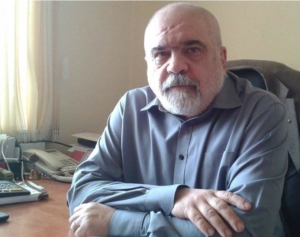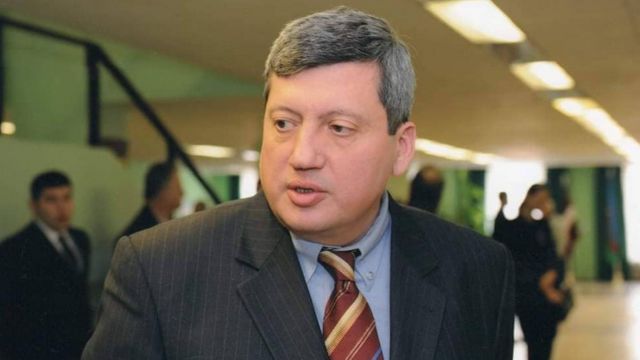"War for Azerbaijan is a means to remove compromise" - Armenian political scientist
Political scientist and director of the Caucasus Institute Alexander Iskandaryan shares his views on these issues:
Non-recognition of Karabakh as a concession to Azerbaijan

Armenia has not officially recognized the independence of Nagorno-Karabakh from the beginning of the negotiation process as a concession to Azerbaijan.
Since Karabakh was absent from the negotiating table for many years, Armenia, in fact, acted in its place. And negotiations were going on around the settlement of the Karabakh problem, including around the status of NK, which was supposed to be not the starting point, but the endpoint.
That is why Armenia did not recognize the independence of Nagorno-Karabakh. In order to keep the negotiation process going. By this logic, if Armenia had recognized Karabakh as an independent state from the beginning, there would be nothing to negotiate about.
But now, if the relevance of the negotiation process disappears, if Azerbaijan demands actual surrender, then the meaning of the non-recognition of Nagorno-Karabakh will also disappear.
Formation of new states
All new states in the world were formed by separating from others. There is practically no other type of emergence of new states. The world works like that. At the same time, some states recognize others, while others do not recognize others.
Azerbaijan itself emerged as an independent state as a result of separation from the Soviet Union, and the world recognized this.
Kosovo is recognized by most of the world’s states, while the Serbs do not recognize its secession. Taiwan is recognized by about 30 states. Turkey recognizes the Republic of Northern Cyprus.
There is also the recognition of states, but not on their entire territory. For example, the whole world recognizes Russia, but without Crimea.
Or, for example, Pakistan, for some reason, does not recognize Armenia, and this does not mean that there is no Armenia, and this does not mean that Armenia is an unrecognized state.
Is it possible for other states to recognize the independence of NK?
Yes, it is possible. In our world, recognition is traded, and, in general, it is not so expensive. Especially if the diaspore intensifies its efforts in countries that have no direct interests in Turkey.
However, this will not change the overall situation. The situation can be changed either by recognition from Azerbaijan or from great powers such as Russia, America, China.
But the situation is different now. It has changed since the beginning of the second Karabakh war.
The negotiation process became part of the fighting, and the fighting became part of the negotiation process. The negotiation process is used as one of the weapons in hostilities, and hostilities are used as a way to pressure the negotiation process.
The idea of a compromise and Azerbaijan’s ultimatum
The idea of the so-called Madrid Principles, which is constantly mentioned in connection with the settlement of the conflict, is that the definition of the status of territories is divided into two parts:
• the former Nagorno-Karabakh Autonomous Region with a corridor connecting with Armenia is recognized as a territory seceding from Azerbaijan with an independent status or with the status of reunification with Armenia,
• and the rest of the territory is returned to Azerbaijan in exchange for the status of Karabakh.
All other questions: what kind of a corridor, the width of the corridor, who will support it, what peacekeeping forces will be present, etc are technical questions. However, this is something that the parties have not been able to achieve for years, from the very beginning of the negotiation process to this day.
What is Azerbaijan trying to do? At least on a conversational level, it’s trying to remove the compromise. Baku says: give us Karabakh just like that, in exchange for nothing, just for the fact that we will not kill. The Azerbaijani side says we don’t need people, we need land. And war becomes a means to reverse the compromise itself.
The Armenian side cannot agree to this by definition.
The idea of the Madrid principles is an idea of compromise. And Azerbaijan instead makes the situation a “give or kill”. Accordingly, in this new situation, it is not easy to negotiate.
There could be negotiations on the exchange of prisoners, wounded, bodies of the dead. It is very difficult to imagine substantive negotiations in this situation.
First of all, it is necessary to cease fire, to suspend hostilities – so that later, perhaps someday we will try to have substantive negotiations, which took place earlier in Kazan, in 2011, and which failed because of Azerbaijan, which demanded not just some territories, but Karabakh in general.
It’s hard to imagine peacekeepers in Karabakh
In Russian, the word “peacemaker” has one meaning. The same is in the Armenian language. However, there are several terms in English. One of them is “peacekeeper” – the maintainer of peace. But there is also the term “peace enforcement” – enforcement of peace.
In the case of “peacekeepers”, the consent of all parties to the conflict is required. “Peace enforcement” is the only option when troops are deployed by a decision of the UN Assembly without the consent of the parties to the conflict. In practice, this is a military operation, and it is difficult to imagine such a thing in Karabakh.
Therefore, peacekeepers can be part of a solution that Armenia, Karabakh, and Azerbaijan agree on. But this is also unlikely because what can be achieved from Armenia is difficult to achieve from Azerbaijan – and vice versa.
Along which border should these peacekeepers stand, who will be included in these peacekeepers? How will Iran react to this if, for example, the Americans stand on its border? How will Azerbaijan react if Russians are at the border? It is all very complicated and difficult to implement.
Most likely, they will try to stop the hostilities by pressure from external forces on both sides of the conflict.



















